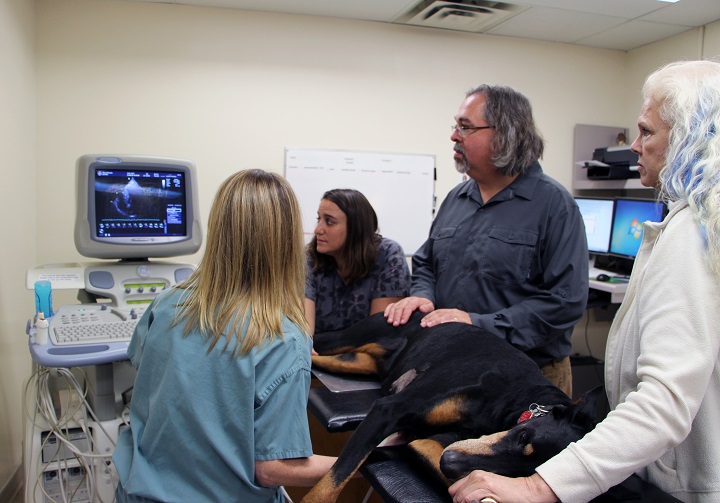Many consider their dogs to be family members – reliable, loving and loyal. Now, you can add potential life saver to that list.

Ground-breaking research conducted at the Ontario Veterinary College at the University of Guelph, uncovered a potential cause of a deadly heart condition in dogs that may lead to a new treatment for humans and canines.
Close to 50 per cent of Doberman Pinschers die from dilated cardiomyopathy (DCM). It also affects other large-breed dogs like Great Danes and Irish wolfhounds. It’s also a common condition in people.
Considering the structure of the human heart and dog heart are “virtually identical,” researchers can find clues that could lead to treatments and cures.
“We are one of only a few centres in the world that can do this and, as far as I know, we are the only centre that has taken samples from dogs,” professor Glen Pyle told Global News.
READ MORE: Animal researchers could find clues that benefit human cancer care
In the new study, scientists identified a potential cause for DCM – a group of muscle proteins that do the contracting in the heart were not functioning the way they should. Collaborating with the University of Washington, researchers tested a naturally occurring molecule that when added made the heart cells function properly.
“The function went completely normal,” Pyle told Global News. “So it was able to completely reverse the disease. We looked for complications, or things we that wouldn’t want the drug to do, and we weren’t able to find any at this point. It seemed to have all beneficial effects.”
Pyle, a professor in OVC’s department of biomedical sciences, said researchers also believe this treatment might be beneficial for a wide variety of heart failure conditions where function is at a lower level. The key is identifying a common problem.
“We just think that the function is at a lower level and this molecule increases that function so that it’s normal,” said Pyle.
Doberman screening

All this was made possible by dogs and their owners taking part in the research. A screening program at OVC means data is collected on Dobermans on an ongoing basis, led by Dr. Lynne O’Sullivan.
One of those dogs is Jeter.
Jeter’s owners, Linda and Bill Squire, lost two dogs to DCM. They take part in the Doberman research because they know how important it is.
“I am just really happy to be part of something that will make a difference in the lives of both humans and dogs,” Linda Squire told Global News.

The cardiologist that Jeter visits is Dr. Lynne O’Sullivan. She partnered with Pyle in the latest research.
“My primary interest is treating my patients and figuring out what might help this devastating disease for this breed because this breed is so heavily affected,” Sullivan told Global News. “At the same time… there may be some novel discoveries here that can help humans with this disorder… it works both ways, absolutely.”
And this is a growing area of research; dogs share close to 350 diseases with humans, offering more opportunities to help people and pooch.
Next up for the research team is the plan for clinical trials for treatment in dogs and in people. The study was published in the American Journal of Physiology.
- Health task force blasted over ‘dangerous guidance’ for cancer screenings
- Dentists hesitant to sign up for federal dental plan; seniors advised to look at all options
- David Chang’s Momofuku to stop ‘chile crunch’ trademark battle after outcry
- Over 25% of young Canadian deaths linked to opioids amid pandemic: study





Comments